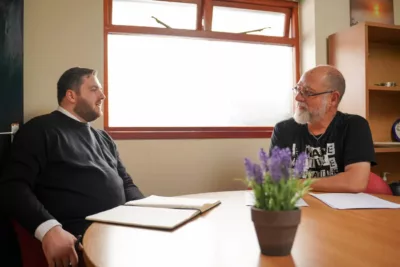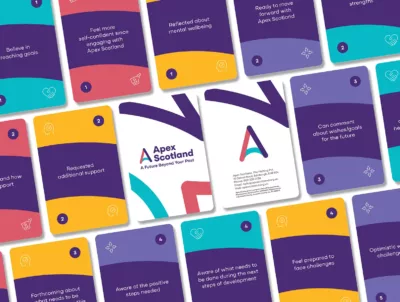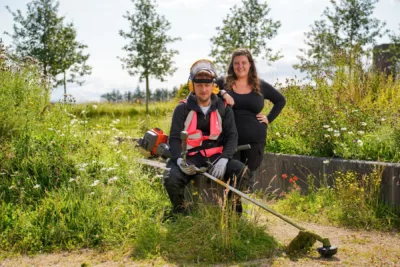
Disclosure Changes
The most noticeable change will be the structure of background checks. From 1st April 2025, anyone undergoing a background check will experience a new, streamlined system.
Apex Scotland, in partnership with the University of Dundee, is thrilled to introduce a new resource: a card deck designed to support a holistic approach to trauma-informed practice. This innovative tool is the culmination of a three-year project funded by The Robertson Trust’s Partners in Change programme.

Three years ago, Apex Scotland began this journey with partners from the University of Dundee (Fernando Fernandes, Teresa Brasio-Mclaughlin and Camilla Dalcin), Jan Montgomery (Psychotherapy), and The Resilience Learning Partnership (Shumela Ahmed and team) to better understand the barriers and drivers to implementing trauma-informed practice within the organisation.
The first-year prioritised listening to the experiences of both staff and service users. The University team gathered invaluable feedback on Apex Scotlands understanding of trauma-informed practice and their aspirations for services and leadership. In the second year, we invested significantly in training and knowledge sharing. Staff received training on the effect of trauma to deepen their understanding of its impact and were provided with guidance around self-care/mindset to support their own wellbeing.
Jan Montgomery invested in monthly training sessions, over 12 months, which translated into staff voicing the importance of building autonomy, expanding windows of tolerance, fostering trust, and promoting overall wellbeing. Furthermore, Shumela Ahmed and The Resilience Learning Partnership guided staff in implementing the NHS trauma lens tool, emphasising the importance of incorporating lived experience in service design and delivery.
The final year highlighted a significant shift in how practitioners viewed their roles and the impact of their work. While traditional outcome measures like securing employment remained important, staff expressed a desire to capture the “softer” outcomes – increased confidence, improved wellbeing, and stronger community connections – which were often overlooked. We set up co-production monthly workshops with a cross-section of our staff to capture reflection and hear suggestions for improvement.
Off the back of feedback, a pilot trial and a final consolidation workshop: the card deck was created. This deck provides a framework for monitoring and feedback, capturing the nuances of personal development in a trauma-informed way. It also guides practitioners by highlighting key areas for exploration and development to incorporate into sessions and enhances group engagement by facilitating interactive games and discussions.
The card deck is supported by a comprehensive training guide, with Apex Scotland and the University of Dundee committed to providing staff training on how to effectively utilise the cards for session planning, generating creative thinking during sessions, and reflecting on progress made. This collaborative project exemplifies Apex Scotland’s dedication to providing trauma-informed support and empowering individuals on their journey to recovery and wellbeing. The card deck represents a valuable new tool in achieving this vision.

The most noticeable change will be the structure of background checks. From 1st April 2025, anyone undergoing a background check will experience a new, streamlined system.

At Apex Scotland, our mission goes beyond providing services. We are committed to transforming lives by building deep, trusting relationships with those we serve.